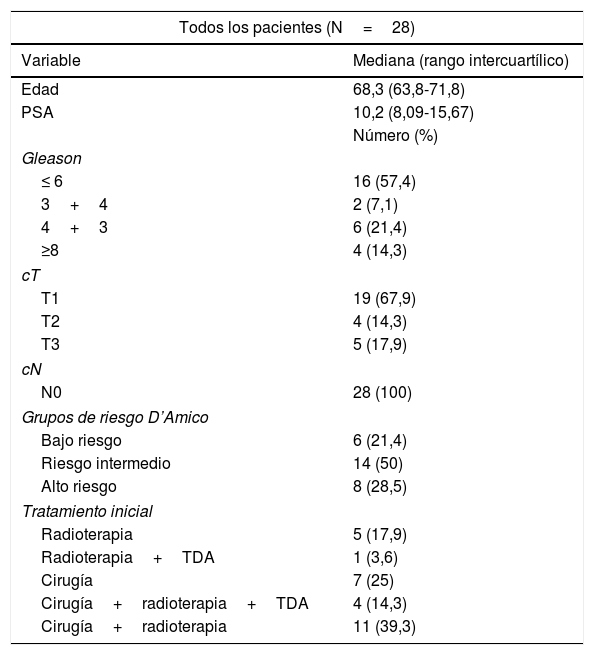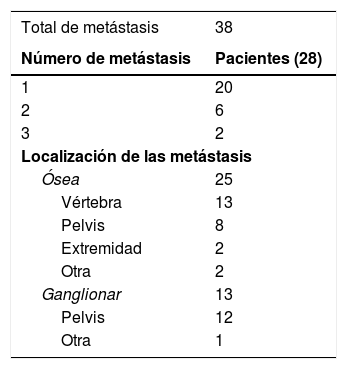La oligorrecurrencia metacrónica en el cáncer de próstata (CaP) la constituyen los pacientes que empezaron con enfermedad localizada y que, tras un tratamiento radical fallido, desarrollan oligometástasis. La radioterapia estereotáctica (SBRT) dirigida a las metástasis busca retrasar el inicio de la privación androgénica. En este estudio, mostramos nuestra experiencia para elucidar el papel de la SBRT en una población seleccionada de pacientes con oligorrecurrencia metacrónica.
Material y métodosAnálisis retrospectivo de pacientes tratados con SBRT por CaP oligorrecurrente entre noviembre de 2015 y diciembre de 2020. Detallamos las características clinicopatológicas al inicio de la enfermedad (edad, PSA, estadificación, tratamiento primario), escenario clínico al diagnóstico de la oligorrecurrencia (PSA, velocidad del PSA, características de las metástasis), supervivencia libre de progresión, supervivencia hasta la resistencia a la castración, dosis y toxicidad de la SBRT. Solo 2pacientes presentaron toxicidad de grado 1.
ConclusionesLa SBRT en pacientes con CaP en situación de oligorrecurrencia metacrónica constituye un tratamiento seguro y efectivo que permite retrasar el inicio de la terapia de radiación androgénica y el tiempo hasta la resistencia a la castración, con niveles bajos de toxicidad.
Metachronous oligorecurrence in prostate cancer (PCa) occurs in patients with localized disease who, after failed radical treatment, develop oligometastases. Metastasis-directed stereotactic radiotherapy (SBRT) aims to delay androgen deprivation therapy. In this study, we report our experience to elucidate the role of SBRT in a selected population of patients with metachronous oligorecurrence.
Material and methodsRetrospective analysis of patients treated with SBRT for oligorecurrent PCa between November 2015 and December 2020. We detailed clinicopathological characteristics at disease onset (age, PSA, stage, primary treatment), clinical scenario at diagnosis of oligorecurrence (PSA, PSA velocity, metastases characteristics), progression-free survival, castration resistance-free survival, dose, and toxicity of SBRT.
ResultsThirty-eight SBRT treatments were applied to 13 lymph node and 25 bone metastases in a total of 28 patients. After a follow-up of 34.57 months (21.17-57.59), 17 patients had radiological progression of the disease and 11 presented castration resistant PCa. PFS and CRFS were 21.93 and 44.13 months, respectively. Only 2patients presented grade 1 toxicity.
ConclusionsIn patients with metachronous oligorecurrent PCa, SBRT constitutes a safe and effective treatment that allows delaying the onset of androgen deprivation therapy and the time to castration resistance, assuming low levels of toxicity.















